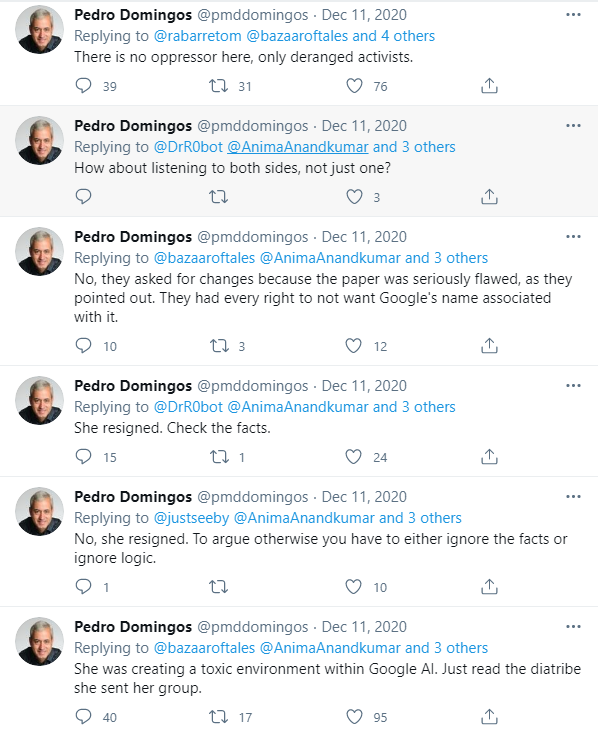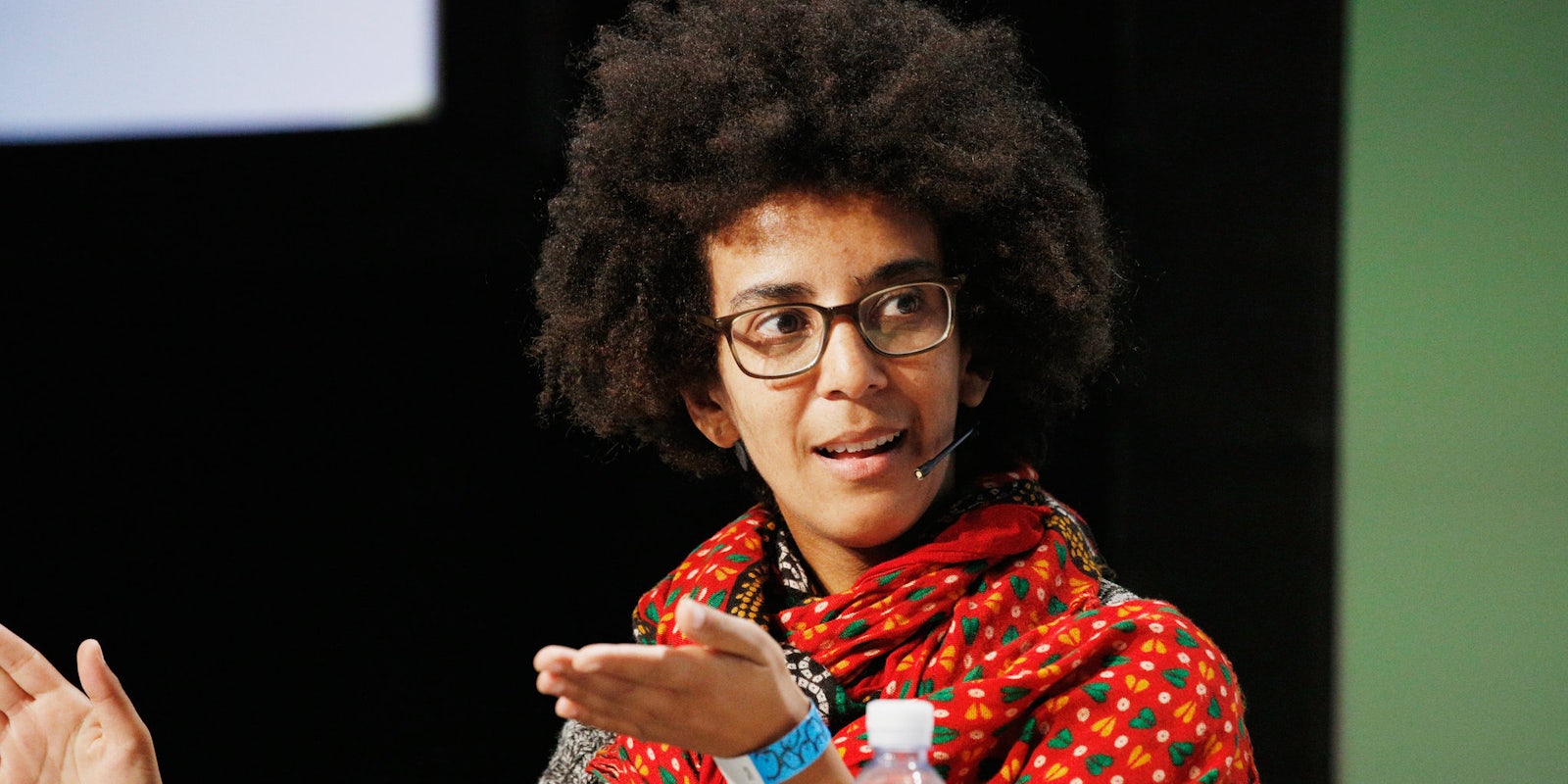The ouster of famed computer scientist Timnit Gebru from Google in early December sent shockwaves through the tech world.
Gebru is one of the most well-known researchers in the field of artificial intelligence (AI), co-author of the groundbreaking 2015 paper demonstrating that facial recognition was less accurate for women and people of color. If she could be forced out (the company says she resigned, Gebru and a slew of others maintain that she was fired) so abruptly, some wondered if anyone was safe. Some believe the matter spotlights ongoing problems at Google, where a vast majority of employees are white men, and which has had issues with diversity in the past.
Many, including thousands of her former colleagues at Google, rallied behind Gebru. A small group, primarily men in tech, have done the opposite. Gebru and those who’ve defended her, many of whom are women of color, say they’re being “harassed” by these men who are “obsessed.”
The men include a professor of computer science at the University of Washington and a famed whistleblower who once filed a bar complaint against a cast member from the Real Housewives of Atlanta.
Gebru’s departure from Google, where she was co-lead of the ethical artificial intelligence (AI) team, was precipitated by a paper she co-authored. The paper detailed the risks of training machines on large amounts of text data, or large language models. According to the MIT Technology Review, these risks range from environmental, it takes a ton of electricity to train and run large AI models; to financial, it’s incredibly expensive; and discriminatory; data is collected from the internet, so it can incorporate racism, sexism, and other forms of bigotry from the language therein.
At the last minute, Google refused to allow the paper to be published with its name on it. Gebru drew a line in the sand, saying she’d only comply if certain conditions were met; otherwise, she’d resign, Technology Review reports. The company swiftly responded by saying it accepted her resignation.
Her colleagues, direct supervisor, and others have come to Gebru’s defense. They back up her account that she was fired, and say that it’s a symptom of Google’s non-inclusive workplace. As of 2018, only 2.5% of its workplace was Black. Black women, like Gebru, are few and far between.
Some men on Twitter aren’t having it.
Since Dec. 11, Pedro Domingos, the professor, has tweeted at and about Gebru dozens of times. He’s made the issue into something of a platform of himself.
In response to questions about why he felt compelled to attack Gebru, Domingos directed the Daily Dot to read two pieces he wrote about the issue. In Quillette, he claimed that “a small mob of social justice radicals” attacked him via his employer following his academic critiques of the paper. In the Spectator, he warned against “militant liberals … politicizing artificial intelligence,” arguing that removing bias from algorithms actually adds bias.
Domingos further claimed that Gebru started it and that she and others have defamed, attacked, and harassed him. “If you print their lies and misdirections, you are aiding and abetting them,” he said. “Please be very sure that what you write is true, not misleading, and backed up by evidence. I have the right to defend my good name, and will do so by all means necessary.”
In a flurry of tweets on Dec. 11, he called Gebru and her defenders “deranged activists,” said her paper (which had not yet been released) was “seriously flawed,” and claimed she “was creating a toxic environment” at Google. He also repeatedly insisted that Gebru resigned, despite having no apparent inside knowledge of the situation.

Gebru commented on these tweets three times that day. She first linked to an article detailing her team’s denial of Google’s claim that she resigned. When Domingos still insisted she was fired, she replied, “Read the actual linked doc. But I can’t help you here since it seems you’re not interested in facts….”
Domingos responded by accusing her of “insulting” him, which “is perfect for an ethics researcher.”
The largely one-sided feud has continued sporadically in the weeks since then. Domingo will fall silent for a week or more at times, only to tweet at Gebru several times in a single day, often hopping onto threads to criticize her, either directly or by linking to anonymous Reddit comments about her.
Some accuse him of creating a sock puppet account to amplify what they see as abuse, which he has denied, and claim that he and others bullied another woman into deleting her Twitter account.
Although he’s the one who helped stoked the conflict, and has insulted Gebru’s work and effectively called her a liar repeatedly, there’s a certain pearl-clutching quality to some of Domingos’ tweets.
When Gebru told him to “go fuck yourself,” Domingo replied, “This is how an AI ethicist speaks to a fellow computer scientist.”
Domingos has consistently cast himself as a victim. In Quilette, he wrote on “Beating back cancel culture: A case study from the field of artificial intelligence,” counseling people to “mock them mercilessly,” never back down, “goad them into overreaching.” And don’t be afraid to sue.
“The courts can be your friend when confrontations with the cancel crowd can’t be resolved through less formal and expensive means,” he writes.
Both Gebru and Domingos have claimed the other is obsessed.


Domingos, who is a colleague of one of Gebru’s co-authors on the paper, Professor Emily M. Bender, hasn’t been the only man in the tech world going after the women and what they see as “woke” culture run awry.
Michael Lissack, a member of the International Academy for Systems and Cybernetic Sciences and former whistleblower, has been laser-focused on Gebru and her allies for weeks. He’s tweeted roughly 2,000 times since creating a Twitter account last month and wrote an entire paper criticizing hers. Nearly all his tweets appear to be about the matter.
His Twitter account is now suspended.
“Google is clearing ranks of its woke activists so that the scientists can go back to work,” Lissack wrote on Jan. 28. The tweet tagged Gebru, Bender, Domingos and others. Many, many of his tweets tag Domingos.
He’s also gone after those defending her, at times in deeply personal ways. Gebru and others believe he created the account for the sole purpose of “stalking” and “harassing” them.
Lissack also somewhat obsessively tagged people in links to the paper he wrote blasting Gebru’s research as biased and based on politics rather than science. Like Domingos, Lissack also posted screenshots of Reddit comments critical of Gebru.
Gebru has said Lissack is “stalking” her and her colleagues. One Twitter user claims that Lissack randomly sent them “screenshots of her Twitter arguments” after they interacted with Gebru online; another said that after she blocked him, he began emailing screenshots of her tweets “to let me know he was still keeping tabs on me.”
“Pointing out to those who claim otherwise that [Gebru’s paper] is nothing more than a poorly written advocacy piece and is far from being a sound piece of scientific research was my only goal,” Lissack told the Daily Dot via email. “My critique has been downloaded in full-text over 4,000 times. Mission accomplished. I have no ongoing use for or interest in Twitter and its toxic environment.”
The men’s apparent rage about Gebru’s conflict with Google and the content of her paper is bizarre. They seem to see themselves as champions of Google and feel that Gebru and her allies should put up or shut up—just as women, particularly women of color, have always been expected to do.
Their anger, however strange, seems to boil down to the women questioning the status quo in the overwhelmingly male tech world.

The world of tech is incredibly white and male. There’s been increased focus on this fact in recent years and some effort to change this. Gebru is among the most notable people pursuing such. Many believe that as long as technology is populated and led by the group that has disproportionate power in society, it will be plagued with familiar issues associated with lack of representation by marginalized groups, which further perpetuates marginalization.
This is precisely what Gebru and others have been working to correct. It seems that some men would rather they leave the status quo alone.


